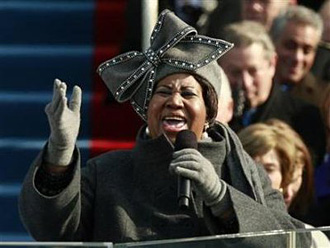
|  |  |  Editorials | Opinions | January 2009 Editorials | Opinions | January 2009  
Obama's Train Ride to the Future
 John M. Crisp - Capitol Hill Blue John M. Crisp - Capitol Hill Blue
go to original


| | Aretha Franklin signs during the inauguration ceremony for President-elect Barack Obama in Washington, January 20, 2009. (Jason Reed/Reuters) |  |
Everyone will have her own way of thinking about the remarkable events centered on January 20, 2009. Some probably thought the over-sized bow on Aretha Franklin's hat was outrageously over the top, but when she began to sing, everything about her - including the bow - was perfect.

Many will fondly recall the welcome sight of George W. Bush's helicopter leaving Washington for the last time. Others will think of the fumbled oath of office, the multitudes on the mall, and the inaugural balls. Or President Obama's speech.

I'll confess that I've always been a sucker for aspirational rhetoric, but the conservative columnists who complain that Obama didn't swing for the fences with his inaugural address should remember that it brought tears to the eyes of millions. If you're tempted to take the quibblers' complaints too seriously, spend some time trying to imagine the speech that they would have loved and praised. Impossible.

Personally, I liked Obama's train ride from Philadelphia to Washington on the Saturday before his inauguration. The trip was meant to look backwards, to invoke Abraham Lincoln's journey to the White House in 1861. Obama traveled in a vintage 1939 rail carriage trimmed with patriotic bunting, and his several whistle stops along the way conjured the quaint look and feel of the past, except this time an African-American was the president, not the Pullman porter.

But I'd like to think of the train trip as looking forward, as well. In his inaugural speech President Obama called upon Americans to contemplate and confront real change in our country, and there's no facet of our lives riper for change than the ways in which we get from one place to another.

The problem isn't just that we're running out of the fuel that we use to power our internal combustion engines or that the internal combustion engine produces an unhealthy polluting exhaust. The bigger problem is the inefficient principle built into our approach to transportation: our vehicles are designed to carry 4, 5, or 6 people, as well as cargo, thousands of miles at high rates of speed; but much of the time we use them for short, unaccompanied, comparatively low-speed trips close to home, trips that often require considerable idling in traffic.

We're fond of the flexibility and freedom that our high-powered vehicles provide, but can we any longer afford their inherent inefficiency and fumes? Quoting I Corinthians 13:11, Obama challenged us to "put away childish things," which is another way of saying that it's time to begin to face our problems like grownups. Sometimes that means doing what's necessary instead of what we want.

Let's consider travel in three ways: Air travel is superior for long distances, especially over water, and perhaps we should preserve our diminishing petroleum resources for jet fuel. In terms of efficiency, plug-in electric vehicles are clearly the right choice for the great majority of driving that Americans do, that is, daily trips of fewer than 100 miles.

But for inter-city distances of up to, say, 700 miles, let's consider a network of fast, efficient, electricity-driven high-speed trains. Our preference for driving long distances was learned in the absence of good alternatives, and it can be unlearned and replaced by the comfort, convenience, and efficiency that an innovative American rail system could provide.

We're considering spending many billions for refurbishing our inefficient, antiquated transportation system. This money would be better spent on re-conceiving from top to bottom how we travel and creating a transportation system that copes with current realities, rather than preserving the mistakes of the past.

Is a deep re-conception of how we get around possible? Certainly. All of the required technology is already available; the only thing in question is our supply of will and maturity.

(John M. Crisp teaches in the English Department at Del Mar College in Corpus Christi, Texas. E-mail him at jcrisp(at)delmar.edu.) |

 |
|  |



